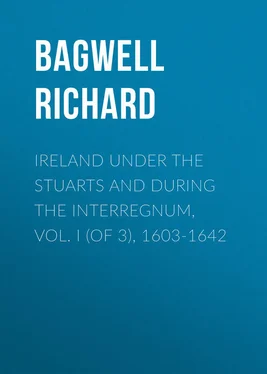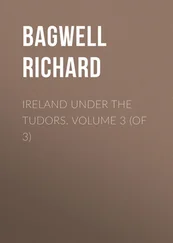Richard Bagwell - Ireland under the Stuarts and during the Interregnum, Vol. I (of 3), 1603-1642
Здесь есть возможность читать онлайн «Richard Bagwell - Ireland under the Stuarts and during the Interregnum, Vol. I (of 3), 1603-1642» — ознакомительный отрывок электронной книги совершенно бесплатно, а после прочтения отрывка купить полную версию. В некоторых случаях можно слушать аудио, скачать через торрент в формате fb2 и присутствует краткое содержание. Жанр: foreign_antique, foreign_prose, на английском языке. Описание произведения, (предисловие) а так же отзывы посетителей доступны на портале библиотеки ЛибКат.
- Название:Ireland under the Stuarts and during the Interregnum, Vol. I (of 3), 1603-1642
- Автор:
- Жанр:
- Год:неизвестен
- ISBN:нет данных
- Рейтинг книги:4 / 5. Голосов: 1
-
Избранное:Добавить в избранное
- Отзывы:
-
Ваша оценка:
- 80
- 1
- 2
- 3
- 4
- 5
Ireland under the Stuarts and during the Interregnum, Vol. I (of 3), 1603-1642: краткое содержание, описание и аннотация
Предлагаем к чтению аннотацию, описание, краткое содержание или предисловие (зависит от того, что написал сам автор книги «Ireland under the Stuarts and during the Interregnum, Vol. I (of 3), 1603-1642»). Если вы не нашли необходимую информацию о книге — напишите в комментариях, мы постараемся отыскать её.
Ireland under the Stuarts and during the Interregnum, Vol. I (of 3), 1603-1642 — читать онлайн ознакомительный отрывок
Ниже представлен текст книги, разбитый по страницам. Система сохранения места последней прочитанной страницы, позволяет с удобством читать онлайн бесплатно книгу «Ireland under the Stuarts and during the Interregnum, Vol. I (of 3), 1603-1642», без необходимости каждый раз заново искать на чём Вы остановились. Поставьте закладку, и сможете в любой момент перейти на страницу, на которой закончили чтение.
Интервал:
Закладка:
White was allowed to return to Waterford, being plainly told that he would be proclaimed a traitor unless he pronounced it unlawful for subjects to resist their sovereign. The prospect of being hanged by martial law quickened his theological perceptions, and he came back after nightfall with the required declaration. Lord Power also came to make peace for the townsmen, and Mountjoy promised to intercede for them with the King. Next morning the gates were occupied, at one of which the acting mayor surrendered the keys and the civic sword. The latter was restored to the corporation, but the keys were handed to the provost-martial. Sir Richard Aylward was brought back in triumph, bearing the King’s sword before the Viceroy, who grimly remarked that he would leave a garrison of 150 men in one of the gate-towers so that the mob might not again prove too strong for the mayor. An oath of allegiance was generally taken even by the priests, but White and two other Jesuits seem to have avoided putting their names to it. Mountjoy notes with just pride that his soldiers, drawn out of the hungry north and excited by the hope of plunder, did not do one pennyworth of mischief in the city, though provisions were exorbitantly dear. The place was at their mercy all day, but the whole force, except the 150 men, evacuated it in perfect order before nightfall. 5 5 Authorities last quoted; also Hogan’s Hibernia Ignatiana , p. 121.
The Irish Catholics were at this time more or less persecuted, and toleration is so excellent a thing that the historical conscience is likely to be in favour of those who claimed it. But in the then state of Ireland it is doubtful whether the public exercise of both religions was possible. The sovereign of Wexford said his fellow townsmen would have been satisfied with the use of one church without any meddling with tithes or other property of the Establishment. But the ultramontane priests, though they might have provisionally accepted this in some large towns, aimed at complete supremacy, and they were the real popular guides. Mr. Pillsworth, the parson of Naas, when he saw the people flocking to high mass, fled to Dublin and thence to England. He may have been a timid man, but his terror was not altogether unfounded. At Navan, another clergyman named Sotherne, accompanied by several gentlemen, saw two friars in the dress of their order and began to question them in the King’s name. ‘James, King of Scotland,’ said the elder of the two in Latin, ‘is a heretic; may he perish with thee and with all who have authority under him.’ Sotherne charged him with high treason, but the constable was foiled by the mob who gathered round him. ‘Thy companions,’ said the friar, ‘are no Christians since they suffer thee among them,’ and he repeated this several times in Irish for the benefit of the bystanders. A Mr. Wafer, who said he had known the friar for twenty years, and that he was an honest man, rebuked Sotherne as a ‘busy companion,’ and pointedly observed that he would get no witnesses to support his charge of treason. As some of the crowd seemed bent on violence, Sotherne bade the constable do nothing for this time, and so returned to his lodging. He remonstrated afterwards with Wafer, who said that he ‘thought no less, but I would grow a promoter, and that was cousin-german to a knave; wishing his curse upon all those that would assist in apprehending either friar or priest.’ And popular opinion was entirely on Mr. Wafer’s side. 6 6 Hogan’s Hibernia Ignatiana , p. 118; Declaration of Edward Sotherne, June 16.
But perhaps the best testimony is that of two Irish Jesuits, writing to their own general, and not intending that profane eyes should ever see what they had written: – ‘From our country we learn for certain that the Queen of England’s death being known in Waterford, Cork, and Clonmel, principal towns of the kingdom, the ministers’ books were burned and the ministers themselves hunted away, and that thereupon masses and processions were celebrated as frequently and upon as grand a scale as in Rome herself. The Viceroy did not like this, and sent soldiers to garrison those towns, as he supposed, but the beauty of it is that those very soldiers vied with each other in attending masses and Catholic sermons. In the metropolitan city of Cashel, to which we belong, there was one solitary English heretic, and, on the news of the Queen’s death being received, they threatened him with fire and every other torment if he would not be converted. Fearing to be well scorched he made himself a Catholic, whereupon the townsmen burned his house, so that even a heretic’s house should not remain in their city. But when the Viceroy came near enough to threaten Cashel, and the Englishmen came forward to accuse the townsmen, he merely ordered them to rebuild the house at their own expense… I only beg your Paternity to show this letter to the most illustrious and most reverend Primate of Armagh (Peter Lombard), and to excuse me for not having written to him specially because I am unwilling to multiply letters in these dangerous times.’ 7 7 Barnabas Kearney and David Wale to Aquaviva (Italian), July 7, 1603, from London, in Hibernia Ignatiana , p. 117. The burning of the service-book is mentioned in the official correspondence.
The mere approach of Mountjoy was enough to overawe Cashel, Clonmel, and the other inland towns. Limerick was bridled by the castle, and the disorders there did not come to much. But at Cork things took a much more serious turn. When leaving Ireland Carew had left his presidential authority in the hands of Commissioners, of whom Sir Charles Wilmot was the chief. The corporation of Cork now declared that the Commissioners’ authority ceased on the demise of the Crown, and that they were sovereign within their own liberties. Captain Robert Morgan arrived at Cork on April 11 with a copy of the proclamation and orders for the Commissioners from Mountjoy. Wilmot was in Kerry stamping out the embers of Lord Fitzmaurice’s insurrection, and Sir George Thornton, who was next in rank, called upon the civic authorities to proclaim King James. Thomas Sarsfield was mayor, and he might have obeyed but for the advice of William Meade, the recorder, who defied Thornton to exercise any authority within the city, reminding him that too great alacrity in proclaiming Perkin Warbeck had brought great evils upon the kingdom. Being rebuked by Boyle for breaking out into violent language, he replied that there were thousands ready to break out. Power was claimed under the charter to delay for some days, and Meade sent a messenger to Waterford for information as though the Lord Deputy’s letters were unworthy of credit. Captain Morgan vainly urged that he had himself been present when Ormonde, the most cautious of men, had proclaimed the King at Carrick-on-Suir. Thornton and the other Commissioners, including Chief Justice Walsh and Saxey the provincial Chief Justice, were kept walking about in the streets while the corporation wasted time, and at last they were told that no answer could be given until next day. The mayor and recorder protested their loyalty, but pretended among other things that time was necessary to enable them to make due preparation. In vain did Thornton and his legal advisers insist on the danger of delay, and upon the absurdity of Cork refusing to do what London and Dublin had done instantly. Meade would listen to nothing; and one clear day having elapsed since Morgan’s arrival, Thornton went with his colleagues and about 800 persons to the top of a hill outside the town, where he solemnly proclaimed King James. Lord Roche was present, and the country folk seemed quite satisfied. The mayor soon followed suit at the market cross. The ceremonial of which the corporation had made so much was only the drinking of a hogshead of wine by the people, and no doubt that was a function which the citizens were always ready to perform at the shortest notice. 8 8 Brief Declaration in Carew , 1603, No. 5; account written by Richard Boyle in Lismore Papers , 2nd series, i. 43. As clerk of the Munster Council Boyle was an eye-witness of all these proceedings. Moryson’s Itinerary , part ii. book iii. chap. 2.
Интервал:
Закладка:
Похожие книги на «Ireland under the Stuarts and during the Interregnum, Vol. I (of 3), 1603-1642»
Представляем Вашему вниманию похожие книги на «Ireland under the Stuarts and during the Interregnum, Vol. I (of 3), 1603-1642» списком для выбора. Мы отобрали схожую по названию и смыслу литературу в надежде предоставить читателям больше вариантов отыскать новые, интересные, ещё непрочитанные произведения.
Обсуждение, отзывы о книге «Ireland under the Stuarts and during the Interregnum, Vol. I (of 3), 1603-1642» и просто собственные мнения читателей. Оставьте ваши комментарии, напишите, что Вы думаете о произведении, его смысле или главных героях. Укажите что конкретно понравилось, а что нет, и почему Вы так считаете.












